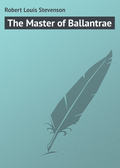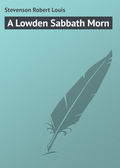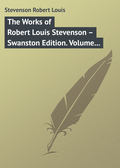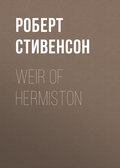
Роберт Льюис Стивенсон
An Inland Voyage
ORIGNY SAINTE-BENOÎTE
A BY-DAY
The next day was Sunday, and the church bells had little rest; indeed, I do not think I remember anywhere else so great a choice of services as were here offered to the devout. And while the bells made merry in the sunshine, all the world with his dog was out shooting among the beets and colza.
In the morning a hawker and his wife went down the street at a foot-pace, singing to a very slow, lamentable music ‘O France, mes amours.’ It brought everybody to the door; and when our landlady called in the man to buy the words, he had not a copy of them left. She was not the first nor the second who had been taken with the song. There is something very pathetic in the love of the French people, since the war, for dismal patriotic music-making. I have watched a forester from Alsace while some one was singing ‘Les malheurs de la France,’ at a baptismal party in the neighbourhood of Fontainebleau. He arose from the table and took his son aside, close by where I was standing. ‘Listen, listen,’ he said, bearing on the boy’s shoulder, ‘and remember this, my son.’ A little after he went out into the garden suddenly, and I could hear him sobbing in the darkness.
The humiliation of their arms and the loss of Alsace and Lorraine made a sore pull on the endurance of this sensitive people; and their hearts are still hot, not so much against Germany as against the Empire. In what other country will you find a patriotic ditty bring all the world into the street? But affliction heightens love; and we shall never know we are Englishmen until we have lost India. Independent America is still the cross of my existence; I cannot think of Farmer George without abhorrence; and I never feel more warmly to my own land than when I see the Stars and Stripes, and remember what our empire might have been.
The hawker’s little book, which I purchased, was a curious mixture. Side by side with the flippant, rowdy nonsense of the Paris music-halls, there were many pastoral pieces, not without a touch of poetry, I thought, and instinct with the brave independence of the poorer class in France. There you might read how the wood-cutter gloried in his axe, and the gardener scorned to be ashamed of his spade. It was not very well written, this poetry of labour, but the pluck of the sentiment redeemed what was weak or wordy in the expression. The martial and the patriotic pieces, on the other hand, were tearful, womanish productions one and all. The poet had passed under the Caudine Forks; he sang for an army visiting the tomb of its old renown, with arms reversed; and sang not of victory, but of death. There was a number in the hawker’s collection called ‘Conscrits Français,’ which may rank among the most dissuasive war-lyrics on record. It would not be possible to fight at all in such a spirit. The bravest conscript would turn pale if such a ditty were struck up beside him on the morning of battle; and whole regiments would pile their arms to its tune.
If Fletcher of Saltoun is in the right about the influence of national songs, you would say France was come to a poor pass. But the thing will work its own cure, and a sound-hearted and courageous people weary at length of snivelling over their disasters. Already Paul Déroulède has written some manly military verses. There is not much of the trumpet note in them, perhaps, to stir a man’s heart in his bosom; they lack the lyrical elation, and move slowly; but they are written in a grave, honourable, stoical spirit, which should carry soldiers far in a good cause. One feels as if one would like to trust Déroulède with something. It will be happy if he can so far inoculate his fellow-countrymen that they may be trusted with their own future. And in the meantime, here is an antidote to ‘French Conscripts’ and much other doleful versification.
We had left the boats over-night in the custody of one whom we shall call Carnival. I did not properly catch his name, and perhaps that was not unfortunate for him, as I am not in a position to hand him down with honour to posterity. To this person’s premises we strolled in the course of the day, and found quite a little deputation inspecting the canoes. There was a stout gentleman with a knowledge of the river, which he seemed eager to impart. There was a very elegant young gentleman in a black coat, with a smattering of English, who led the talk at once to the Oxford and Cambridge Boat Race. And then there were three handsome girls from fifteen to twenty; and an old gentleman in a blouse, with no teeth to speak of, and a strong country accent. Quite the pick of Origny, I should suppose.
The Cigarette had some mysteries to perform with his rigging in the coach-house; so I was left to do the parade single-handed. I found myself very much of a hero whether I would or not. The girls were full of little shudderings over the dangers of our journey. And I thought it would be ungallant not to take my cue from the ladies. My mishap of yesterday, told in an off-hand way, produced a deep sensation. It was Othello over again, with no less than three Desdemonas and a sprinkling of sympathetic senators in the background. Never were the canoes more flattered, or flattered more adroitly.
‘It is like a violin,’ cried one of the girls in an ecstasy.
‘I thank you for the word, mademoiselle,’ said I. ‘All the more since there are people who call out to me that it is like a coffin.’
‘Oh! but it is really like a violin. It is finished like a violin,’ she went on.
‘And polished like a violin,’ added a senator.
‘One has only to stretch the cords,’ concluded another, ‘and then tum-tumty-tum’ – he imitated the result with spirit.
Was not this a graceful little ovation? Where this people finds the secret of its pretty speeches, I cannot imagine; unless the secret should be no other than a sincere desire to please? But then no disgrace is attached in France to saying a thing neatly; whereas in England, to talk like a book is to give in one’s resignation to society.
The old gentleman in the blouse stole into the coach-house, and somewhat irrelevantly informed the Cigarette that he was the father of the three girls and four more: quite an exploit for a Frenchman.
‘You are very fortunate,’ answered the Cigarette politely.
And the old gentleman, having apparently gained his point, stole away again.
We all got very friendly together. The girls proposed to start with us on the morrow, if you please! And, jesting apart, every one was anxious to know the hour of our departure. Now, when you are going to crawl into your canoe from a bad launch, a crowd, however friendly, is undesirable; and so we told them not before twelve, and mentally determined to be off by ten at latest.
Towards evening, we went abroad again to post some letters. It was cool and pleasant; the long village was quite empty, except for one or two urchins who followed us as they might have followed a menagerie; the hills and the tree-tops looked in from all sides through the clear air; and the bells were chiming for yet another service.
Suddenly we sighted the three girls standing, with a fourth sister, in front of a shop on the wide selvage of the roadway. We had been very merry with them a little while ago, to be sure. But what was the etiquette of Origny? Had it been a country road, of course we should have spoken to them; but here, under the eyes of all the gossips, ought we to do even as much as bow? I consulted the Cigarette.
‘Look,’ said he.
I looked. There were the four girls on the same spot; but now four backs were turned to us, very upright and conscious. Corporal Modesty had given the word of command, and the well-disciplined picket had gone right-about-face like a single person. They maintained this formation all the while we were in sight; but we heard them tittering among themselves, and the girl whom we had not met laughed with open mouth, and even looked over her shoulder at the enemy. I wonder was it altogether modesty after all? or in part a sort of country provocation?
As we were returning to the inn, we beheld something floating in the ample field of golden evening sky, above the chalk cliffs and the trees that grow along their summit. It was too high up, too large, and too steady for a kite; and as it was dark, it could not be a star. For although a star were as black as ink and as rugged as a walnut, so amply does the sun bathe heaven with radiance, that it would sparkle like a point of light for us. The village was dotted with people with their heads in air; and the children were in a bustle all along the street and far up the straight road that climbs the hill, where we could still see them running in loose knots. It was a balloon, we learned, which had left Saint Quentin at half-past five that evening. Mighty composedly the majority of the grown people took it. But we were English, and were soon running up the hill with the best. Being travellers ourselves in a small way, we would fain have seen these other travellers alight.
The spectacle was over by the time we gained the top of the hill. All the gold had withered out of the sky, and the balloon had disappeared. Whither? I ask myself; caught up into the seventh heaven? or come safely to land somewhere in that blue uneven distance, into which the roadway dipped and melted before our eyes? Probably the aeronauts were already warming themselves at a farm chimney, for they say it is cold in these unhomely regions of the air. The night fell swiftly. Roadside trees and disappointed sightseers, returning through the meadows, stood out in black against a margin of low red sunset. It was cheerfuller to face the other way, and so down the hill we went, with a full moon, the colour of a melon, swinging high above the wooded valley, and the white cliffs behind us faintly reddened by the fire of the chalk kilns.
The lamps were lighted, and the salads were being made in Origny Sainte-Benoîte by the river.
THE COMPANY AT TABLE
Although we came late for dinner, the company at table treated us to sparkling wine. ‘That is how we are in France,’ said one. ‘Those who sit down with us are our friends.’ And the rest applauded.
They were three altogether, and an odd trio to pass the Sunday with.
Two of them were guests like ourselves, both men of the north. One ruddy, and of a full habit of body, with copious black hair and beard, the intrepid hunter of France, who thought nothing so small, not even a lark or a minnow, but he might vindicate his prowess by its capture. For such a great, healthy man, his hair flourishing like Samson’s, his arteries running buckets of red blood, to boast of these infinitesimal exploits, produced a feeling of disproportion in the world, as when a steam-hammer is set to cracking nuts. The other was a quiet, subdued person, blond and lymphatic and sad, with something the look of a Dane: ‘Tristes têtes de Danois!’ as Gaston Lafenestre used to say.
I must not let that name go by without a word for the best of all good fellows now gone down into the dust. We shall never again see Gaston in his forest costume – he was Gaston with all the world, in affection, not in disrespect – nor hear him wake the echoes of Fontainebleau with the woodland horn. Never again shall his kind smile put peace among all races of artistic men, and make the Englishman at home in France. Never more shall the sheep, who were not more innocent at heart than he, sit all unconsciously for his industrious pencil. He died too early, at the very moment when he was beginning to put forth fresh sprouts, and blossom into something worthy of himself; and yet none who knew him will think he lived in vain. I never knew a man so little, for whom yet I had so much affection; and I find it a good test of others, how much they had learned to understand and value him. His was indeed a good influence in life while he was still among us; he had a fresh laugh, it did you good to see him; and however sad he may have been at heart, he always bore a bold and cheerful countenance, and took fortune’s worst as it were the showers of spring. But now his mother sits alone by the side of Fontainebleau woods, where he gathered mushrooms in his hardy and penurious youth.
Many of his pictures found their way across the Channel: besides those which were stolen, when a dastardly Yankee left him alone in London with two English pence, and perhaps twice as many words of English. If any one who reads these lines should have a scene of sheep, in the manner of Jacques, with this fine creature’s signature, let him tell himself that one of the kindest and bravest of men has lent a hand to decorate his lodging. There may be better pictures in the National Gallery; but not a painter among the generations had a better heart. Precious in the sight of the Lord of humanity, the Psalms tell us, is the death of his saints. It had need to be precious; for it is very costly, when by the stroke, a mother is left desolate, and the peace-maker, and peace-looker, of a whole society is laid in the ground with Cæsar and the Twelve Apostles.
There is something lacking among the oaks of Fontainebleau; and when the dessert comes in at Barbizon, people look to the door for a figure that is gone.
The third of our companions at Origny was no less a person than the landlady’s husband: not properly the landlord, since he worked himself in a factory during the day, and came to his own house at evening as a guest: a man worn to skin and bone by perpetual excitement, with baldish head, sharp features, and swift, shining eyes. On Saturday, describing some paltry adventure at a duck-hunt, he broke a plate into a score of fragments. Whenever he made a remark, he would look all round the table with his chin raised, and a spark of green light in either eye, seeking approval. His wife appeared now and again in the doorway of the room, where she was superintending dinner, with a ‘Henri, you forget yourself,’ or a ‘Henri, you can surely talk without making such a noise.’ Indeed, that was what the honest fellow could not do. On the most trifling matter his eyes kindled, his fist visited the table, and his voice rolled abroad in changeful thunder. I never saw such a petard of a man; I think the devil was in him. He had two favourite expressions: ‘it is logical,’ or illogical, as the case might be: and this other, thrown out with a certain bravado, as a man might unfurl a banner, at the beginning of many a long and sonorous story: ‘I am a proletarian, you see.’ Indeed, we saw it very well. God forbid that ever I should find him handling a gun in Paris streets! That will not be a good moment for the general public.
I thought his two phrases very much represented the good and evil of his class, and to some extent of his country. It is a strong thing to say what one is, and not be ashamed of it; even although it be in doubtful taste to repeat the statement too often in one evening. I should not admire it in a duke, of course; but as times go, the trait is honourable in a workman. On the other hand, it is not at all a strong thing to put one’s reliance upon logic; and our own logic particularly, for it is generally wrong. We never know where we are to end, if once we begin following words or doctors. There is an upright stock in a man’s own heart, that is trustier than any syllogism; and the eyes, and the sympathies and appetites, know a thing or two that have never yet been stated in controversy. Reasons are as plentiful as blackberries; and, like fisticuffs, they serve impartially with all sides. Doctrines do not stand or fall by their proofs, and are only logical in so far as they are cleverly put. An able controversialist no more than an able general demonstrates the justice of his cause. But France is all gone wandering after one or two big words; it will take some time before they can be satisfied that they are no more than words, however big; and when once that is done, they will perhaps find logic less diverting.
The conversation opened with details of the day’s shooting. When all the sportsmen of a village shoot over the village territory pro indiviso, it is plain that many questions of etiquette and priority must arise.
‘Here now,’ cried the landlord, brandishing a plate, ‘here is a field of beet-root. Well. Here am I then. I advance, do I not? Eh bien! sacristi,’ and the statement, waxing louder, rolls off into a reverberation of oaths, the speaker glaring about for sympathy, and everybody nodding his head to him in the name of peace.
The ruddy Northman told some tales of his own prowess in keeping order: notably one of a Marquis.
‘Marquis,’ I said, ‘if you take another step I fire upon you. You have committed a dirtiness, Marquis.’
Whereupon, it appeared, the Marquis touched his cap and withdrew.
The landlord applauded noisily. ‘It was well done,’ he said. ‘He did all that he could. He admitted he was wrong.’ And then oath upon oath. He was no marquis-lover either, but he had a sense of justice in him, this proletarian host of ours.
From the matter of hunting, the talk veered into a general comparison of Paris and the country. The proletarian beat the table like a drum in praise of Paris. ‘What is Paris? Paris is the cream of France. There are no Parisians: it is you and I and everybody who are Parisians. A man has eighty chances per cent. to get on in the world in Paris.’ And he drew a vivid sketch of the workman in a den no bigger than a dog-hutch, making articles that were to go all over the world. ‘Eh bien, quoi, c’est magnifique, ca!’ cried he.
The sad Northman interfered in praise of a peasant’s life; he thought Paris bad for men and women; ‘centralisation,’ said he —
But the landlord was at his throat in a moment. It was all logical, he showed him; and all magnificent. ‘What a spectacle! What a glance for an eye!’ And the dishes reeled upon the table under a cannonade of blows.
Seeking to make peace, I threw in a word in praise of the liberty of opinion in France. I could hardly have shot more amiss. There was an instant silence, and a great wagging of significant heads. They did not fancy the subject, it was plain; but they gave me to understand that the sad Northman was a martyr on account of his views. ‘Ask him a bit,’ said they. ‘Just ask him.’
‘Yes, sir,’ said he in his quiet way, answering me, although I had not spoken, ‘I am afraid there is less liberty of opinion in France than you may imagine.’ And with that he dropped his eyes, and seemed to consider the subject at an end.
Our curiosity was mightily excited at this. How, or why, or when, was this lymphatic bagman martyred? We concluded at once it was on some religious question, and brushed up our memories of the Inquisition, which were principally drawn from Poe’s horrid story, and the sermon in Tristram Shandy, I believe.
On the morrow we had an opportunity of going further into the question; for when we rose very early to avoid a sympathising deputation at our departure, we found the hero up before us. He was breaking his fast on white wine and raw onions, in order to keep up the character of martyr, I conclude. We had a long conversation, and made out what we wanted in spite of his reserve. But here was a truly curious circumstance. It seems possible for two Scotsmen and a Frenchman to discuss during a long half-hour, and each nationality have a different idea in view throughout. It was not till the very end that we discovered his heresy had been political, or that he suspected our mistake. The terms and spirit in which he spoke of his political beliefs were, in our eyes, suited to religious beliefs. And vice versâ.
Nothing could be more characteristic of the two countries. Politics are the religion of France; as Nanty Ewart would have said, ‘A d-d bad religion’; while we, at home, keep most of our bitterness for little differences about a hymn-book, or a Hebrew word which perhaps neither of the parties can translate. And perhaps the misconception is typical of many others that may never be cleared up: not only between people of different race, but between those of different sex.
As for our friend’s martyrdom, he was a Communist, or perhaps only a Communard, which is a very different thing; and had lost one or more situations in consequence. I think he had also been rejected in marriage; but perhaps he had a sentimental way of considering business which deceived me. He was a mild, gentle creature, anyway; and I hope he has got a better situation, and married a more suitable wife since then.







